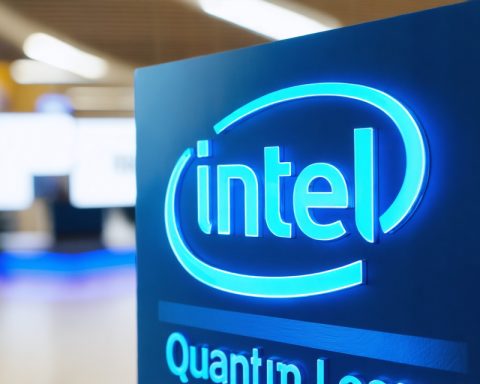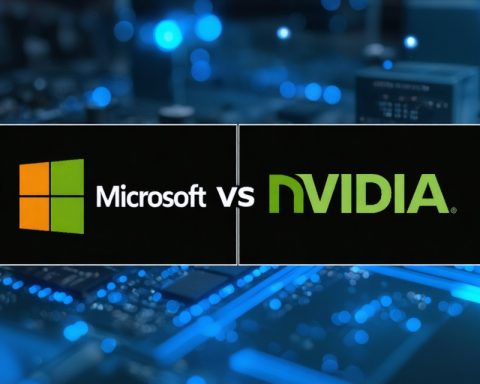- Major stock indices, including the S&P 500, Nasdaq Composite, and Dow Jones, experienced notable declines due to concerns over inflation and growth.
- Attention focuses on Nvidia’s upcoming earnings report, highlighting the competitive nature of the AI chip market and potential growth strategies.
- The core Personal Consumption Expenditures index, a measure of inflation excluding food and energy, is set to release, with hopes of showing a slight decrease.
- Inflation remains above the Federal Reserve’s preferred levels, despite a strong labor market, making interest rate cuts unlikely in the near future.
- Upcoming earnings reports from companies like Home Depot and Salesforce may influence economic outlooks as concerns grow over policy impacts.
- Consumer and business confidence indexes are declining, adding to economic uncertainty and complicating the Federal Reserve’s policy decisions.
Stocks stagger towards the weekend, bruised by a medley of unsettling economic reports that reignite fears of stubborn inflation and sluggish growth. Just days after the S&P 500 basked in a record high, it slid down by nearly 1.7% for the week. Meanwhile, the Nasdaq Composite dropped around 2%, with the Dow Jones Industrial Average leading the downturn with a 3% tumble.
Eyes now turn to Nvidia’s much-anticipated earnings report, a key focus for the week, promising insights into the thriving yet competitive AI chip market. Investors eagerly await CEO Jensen Huang’s comments on growth prospects in this fiercely competitive landscape, especially against rising contenders like China’s DeepSeek.
Economic indicators also loom large: Wall Street awaits the release of the core Personal Consumption Expenditures index on Friday, a critical gauge of inflation excluding volatile food and energy prices. Predictions suggest a slight cooling from December, offering a glimmer of hope amidst persistent inflationary pressures. Still, with inflation above the Federal Reserve’s ideal threshold and a robust labor market, interest rate cuts seem distant.
As corporate heavyweights like Home Depot and Salesforce gear up for their earnings seasons, concerns mount over economic policies impacting growth. The University of Michigan’s consumer sentiment index hit its lowest mark since last fall, while business confidence eroded, casting shadows over the economic horizon.
This volatile dance of markets underlines an essential truth: the path forward is fraught with uncertainty, a challenge for investors seeking stability amid potential policy shifts. As the Fed navigates these choppy waters, the economy’s pulse remains uncertain—balanced between inflationary fears and growth aspirations.
Stocks on the Edge: What You Need to Know About the Market Volatility
How-To Navigate Market Volatility
Investors grappling with the current market climate of inflation concerns and economic uncertainty may find the following steps beneficial:
1. Diversify Your Portfolio: Allocate investments across various sectors to minimize risk. Consider mixing stocks, bonds, and commodities.
2. Focus on Long-Term Goals: Short-term market fluctuations should not derail your long-term financial strategies. Stay focused on your financial goals.
3. Stay Informed: Keep abreast of economic indicators, such as the core Personal Consumption Expenditures index, inflation rates, and employment trends.
4. Consider Defensive Stocks: In times of uncertainty, invest in defensive stocks, such as utilities and consumer staples, which tend to perform well.
5. Consult Financial Advisors: Professional advice can provide valuable insights into safeguarding your investments against volatility.
Real-World Use Cases: AI Industry Insights
Success in the AI chip market, highlighted by Nvidia’s upcoming earnings report, depends on several factors:
– Innovation and R&D: Companies focusing on cutting-edge developments in AI chips are positioning themselves for future success.
– Strategic Partnerships: Collaborations with tech giants and AI developers can boost a company’s competitive edge.
– Market Expansion: Growth opportunities are particularly significant in sectors like autonomous vehicles, data centers, and IoT devices.
Market Forecasts & Industry Trends
The AI chip market is anticipated to grow significantly, with projected market value reaching nearly $200 billion by 2030. The demand for AI-driven applications in sectors like healthcare and automotive is a significant growth driver.
Reviews & Comparisons: Nvidia vs. Competitors
Nvidia continues to lead the AI chip market against competitors like AMD and emerging contenders like DeepSeek. Here is a quick comparison:
– Nvidia: Renowned for high-performance GPUs and comprehensive AI platforms.
– AMD: Competitive in price and performance, particularly in gaming and consumer electronics.
– DeepSeek: Emerging with innovative technologies, targeting AI-driven solutions in new markets.
Controversies & Limitations
Concerns surrounding the AI chip industry include:
– Geopolitical Tensions: U.S.-China trade relations could affect the chip supply chain and market dynamics.
– Ethical Considerations: The rise of AI technology raises data privacy concerns and job displacement fears.
Pros & Cons Overview
Pros:
– Innovation drives new market opportunities.
– Potential for significant financial returns in growing sectors like AI and IoT.
Cons:
– Economic uncertainties can impact investment returns.
– High competition and rapid tech changes pose risks.
Insights & Predictions
– Monetary Policy Impact: Persistent above-target inflation may prolong the Federal Reserve’s rate hikes, perpetuating market volatility.
– Tech Industry Outlook: Despite overall economic challenges, technology remains a key spearhead for growth, particularly in AI development and digital transformation.
Actionable Recommendations
– Stay Disciplined: Keep a balanced perspective on market news to avoid emotional decision-making.
– Leverage Technology: Use investment apps and market analysis tools for informed decision-making.
For more insights into market trends and financial strategies, visit MarketWatch or The Wall Street Journal.











